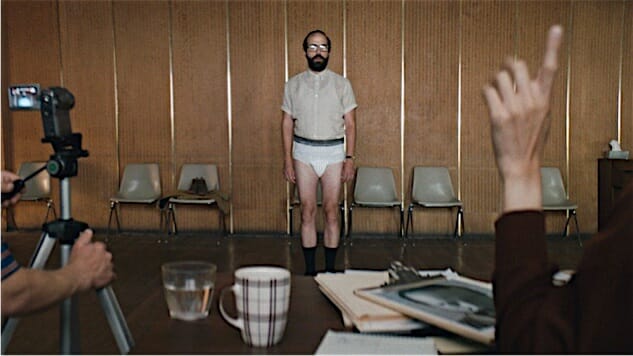Lemon

It’s high past time pop culture discarded cringe comedy orbiting man-child protagonists, and who better to perform that service for humanity than a woman of color? Man-child films, after all, are predominantly authored and led by white dudes, which isn’t to say that this particular genre niche needs to be reclaimed by non-white dudes. Rather, the niche needs to be dissolved and forgotten, if not because the movies that make up this niche trend toward the uninspired then because we’re long past the point where they have anything valuable to offer their audiences.We get it: modern adult white men are stuck in perpetual states of arrested development. In 2017, you can remind yourself of that just by watching the news or checking Twitter.
Enter Janicza Bravo, director and co-writer on Lemon, a blistering, 80-minute indictment of and elegy for unfledged whiteys, mature in age but markedly not so in spirit or intellect. You know this movie. You’ve seen myriad versions of it staged over, say, the last two decades of pop culture or so, from The 40-Year-Old Virgin to Knocked Up to Adult Beginners to Step Brothers, to the majority of Adam Sandler’s oeuvre. But you haven’t seen this movie as staged by Bravo, an outsider to the self-validating dynamics of the fraternity of white male screw-ups. She’s thus better equipped to provide fresh commentary on that fraternity than any random white male might be. Even better, she’s more talented, too.
Her film is an exquisitely wrought portrait of white guy ineptitude disguised as superiority and acumen, though this assumes you equate “exquisite” with wallowing in abject human misery for an hour and a half. In her feature debut, Bravo demonstrates a raw skill behind the lens suggesting a higher ceiling than most of her peers, though her film is no less awkward than anything they’ve made, either. Lemon is a tragicomic ballad of chagrin and stunted masculinity, and yes, it is at times a literal shitshow, a comedy of bodily functions to complement its endless parade of embarrassments. But the sight of Bravo’s co-writer and leading man Brett Gelman fishing a cell phone out of a used toilet doesn’t at all undermine the sophistication and style of her filmmaking. Lemon is a movie whose ideal audience is composed of people best described as “sick fucks”; it’s an endurance test where viewers pit their tolerance for naked displays of ugly masculinity against Bravo’s assured directorial chops. It’s also the best, or maybe most vital, presentation of whiteness in theaters in 2017, or for that matter the last half decade or so of pop culture.
-

-

-

-

-

-

-

-

-

-

-

-

-

-

-

-

-

-

-

-

-

-

-

-

-

-

-

-

-

-

-

-

-

-

-

-

-

-

-

-








































